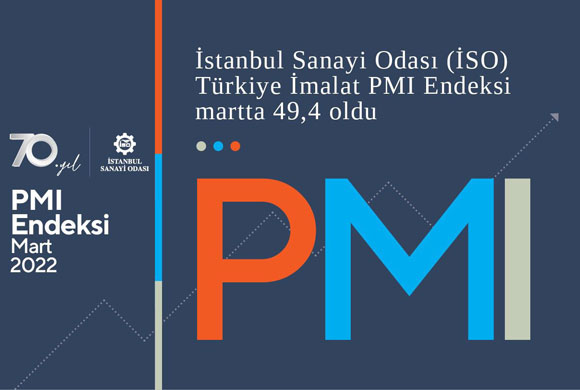News
March 2022 Report of ICI Türkiye Manufacturing PMI and Türkiye Sector PMI Released
- 01.04.2022
- News

The Istanbul Chamber of Industry (ICI) Türkiye Manufacturing PMI (Purchasing Managers’ Index), which is the fastest and reliable reference accepted in manufacturing industry performance of the economic growth, dropped to 49.4 in March, below the 50.0 no-change mark for the first time in the last 10 months. The war in Ukraine was one factor leading to subdued customer demand, with price rises also deterring clients and impacting output. The invasion of Ukraine also caused the rate of expansion in export demand slowed. The rate of job creation also slowed, easing to the weakest in the current 22-month sequence of rising employment.
The ICI Türkiye Sector PMI report for March also showed that difficult business conditions remain in some manufacturing sectors and that the war in Ukraine added to existing challenges. Output and new orders slowed down in most of the sectors, while inflationary pressures were exacerbated and supply chains further disrupted. The most significant slowdown in output was in the non-metallic mineral products sector, while two sectors with increased output were clothing and leather products and land and sea vehicles.
The March 2022 period of Istanbul Chamber of Industry (ISO) Türkiye Manufacturing PMI (Purchasing Managers’ Index) survey, which is the fastest and reliable reference accepted in manufacturing industry performance of the economic growth was announced. According to the results of the survey where any figure greater than 50.0 indicates overall improvement of the sector, the headline PMI posted 49.4 in March, down from 50.4 in February. And it is below the 50.0 no-change mark for the first time in ten months.
Output and new orders moderated for the fourth and sixth successive months, respectively in March. In both cases, the slowdowns were more marked than those seen in February. The war in Ukraine was one factor leading to subdued customer demand, with price rises also deterring clients and impacting output. While total new orders moderated, new business from abroad continued to rise amid some improvements in international demand. But here too, the invasion of Ukraine impacted negatively, leading to a softer pace of expansion. The rate of job creation also slowed, easing to the weakest in the current 22-month sequence of rising employment.
Currency weakness and the war in Ukraine contributed to higher raw material prices in March. The rate of input cost inflation remained elevated, but eased to a five-month low. A number of panelist firms pointed to higher oil prices.
Meanwhile, the rate of output price inflation accelerated and was among the sharpest on record as higher input costs were passed through to customers.
Suppliers’ delivery times lengthened again amid difficulties for vendors obtaining materials, the war in Ukraine and price rises. Moreover, the rate of deterioration in supplier performance was the strongest in three months.
Firms scaled back their purchasing activity at the fastest pace since May 2020 in response to lower new orders and reduced production requirements. A lack of pressure on capacity also meant that manufacturers were able to deplete their backlogs of work to the greatest extent in almost a year.
Commenting on the Istanbul Chamber of Industry Türkiye Manufacturing PMI survey data, Andrew Harker, Economics Director at S&P Global, said:
"The Russian invasion of Ukraine adds a further challenge to those faced by Turkish manufacturers at present, and impacted the sector in a number of ways during March. Already fragile demand was weakened further by the uncertainty caused by the war, while inflationary pressures were exacerbated and supply chains further disrupted."
The war in Ukraine adds further challenges in most of the sectors
The ICI Türkiye Sector PMI report for March also showed that difficult business conditions remain in some manufacturing sectors and that the war in Ukraine added to existing challenges. Output and new orders slowed down in most of the sectors, while inflationary pressures were exacerbated and supply chains further disrupted.
8 out of 10 sectors monitored in March lost momentum in output, with the highest slowdown being in the non-metallic mineral products sector. The highest slowdown in new orders was also recorded in this sector, driven by high inflationary pressures. The sharpest decline since May 2020 was seen in food products, where the slowdown became more noticeable.
The two sectors with increased output were clothing and leather products and land and sea vehicles sectors. Sea and land transport marked a seven-month increase in output, led by the increase in backlogs of work. In March, the only sector that increased its new orders was the chemical, plastic and rubber products sector, which is indicating an improvement for the past three months. In all nine remaining sectors, there is a slowdown in new orders, but increase in new export orders.
Employment was again the most positive area of the manufacturing sector, where in seven out of ten sectors, the number of employees increased. The fastest increase was in the machinery and metal products sector. Among the three sectors with decreased employment, the most significant decrease was in the textile sector. All ten categories saw suppliers' delivery times lengthen. However, the extent of the deterioration in supplier performance varied widely among sectors. The highest rise in delivery times was again in the electrical and electronic products sector, while the lowest rise was in textile.
The electrical and electronic products saw the fastest rise in input cost inflation due to severe disruption of supply chains. The lowest inflation was recorded in the textile sector, the weakest rise of the last seven months.
Textile products was also the sector with the lowest rate of final product price inflation. The sharpest increase in sales prices was measured in the basic metals sector.
You can find attached the Istanbul Chamber of Industry Türkiye Manufacturing PMI and Sector PMI March 2022 reports.